Melbourne reflects on Night of Broken Glass
On November 9, Melbourne's Jewish community commemorated the 79th anniversary of the Night of Broken Glass, when a Nazi pogrom against Jews swept through Germany, Austria and the Sudetenland.

THE shingle “bed maker” adorned the Jewish store in the black-and-white newsreel, but the scrawl over the sign read “Jew”.
The fleeting shot, one of many shown in archival footage at a Kristallnacht commemoration in Melbourne, encapsulated the night Nazi Germany went further than ever before in robbing its Jews of their dignity and humanity.
Commemorating the 79th anniversary of November 9, 1938, the Night of Broken Glass, when a Nazi pogrom swept Germany, Austria and the Sudetenland, the gathering at Glen Eira Town Hall viewed the graphic film footage.
And they heard from a local survivor, and from a visiting scholar who gave the Betty and Shmuel Rosenkranz Oration.
Andy Factor recalled the sounds of smashing and pillaging around his childhood home in the town of Falkenstein on Kristallnacht. Two phone calls were made to his father, advising that nobody should venture into the streets that night.
“The atmosphere at our place was dismal. My father said, ‘This is the end, there is nothing left for us here’,” recalled Factor.
Next morning, Factor rode his bike through ravaged streets to his family’s factory and saw his father under arrest. The youngster wanted to flee, but decided to join his father. “We walked down the street together in custody, as neighbours looked on.”
With other Jews, they were locked in the town hall cellars. Next day, they were forced into a truck, where elderly Jews huddled with injuries from Nazis’ rifle butts as they had not jumped into the vehicle quickly enough.
They were sent to a prison in a neighbouring town. “I can still hear the clanging of our footsteps on the metal stairs,” said Factor.
Later making a new life in Australia as a visual artist, Factor’s life story is chronicled in the Lamm Jewish Library. He now works as a survivor guide at the Jewish Holocaust Centre (JHC).
Delivering the Rosenkranz Oration, US Holocaust scholar Mark Weitzman, the Simon Wiesenthal Centre’s director of government affairs, described his leading role in the International Holocaust Remembrance Authority’s adoption of the first “working definition of anti-Semitism” and he hopes Australia will adopt the definition.
JHC co-president Pauline Rockman paid tribute to the late Betty and Shmuel Rosenkranz. She said Shmuel, an eyewitness to Kristallnacht and a founding father of the JHC, possessed “a European sensitivity, but with a firm grip on the future”.
PETER KOHN

comments